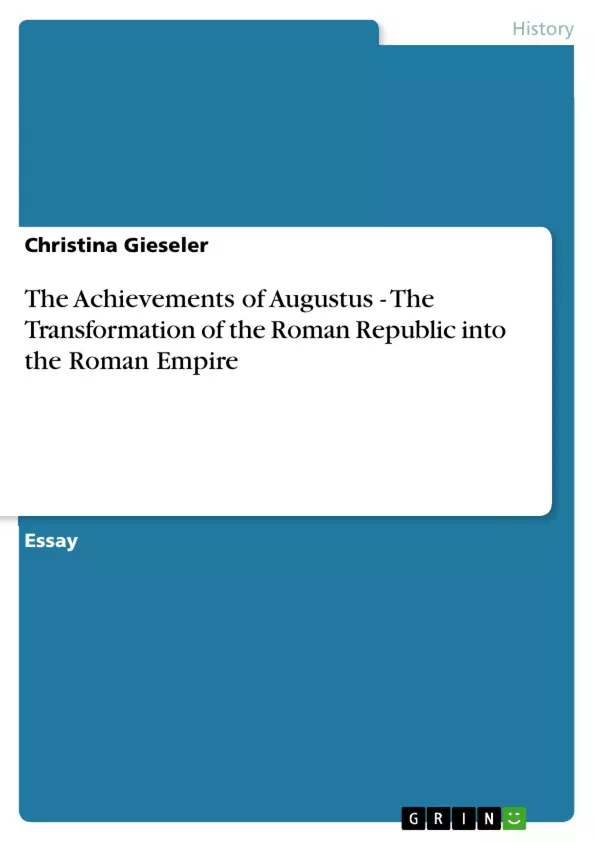How did Augustus transform the Roman republic into an empire? Why was he successful where Julius Caesar had not been? What was the process and what were the results of the changes Augustus introduced? In this essay, various sources about the first emperor of the Roman Empire will be examined, such as those of Augustus himself, of contemporary or later historians, and archaeological evidence. Generally, it can be stated that Augustus rather used the Republican system including all its traditional positions and regulations to gain power, whereas Caesar opposed the traditional ways of political life and therewith made himself the enemy of the state. Augustus
achieved his position as the mightiest man in the empire through several strategies, e.g. by clever political/military strategies such as...
Table of Contents
- The Achievements of Augustus – The Transformation of the Roman Republic into the Roman Empire
Objectives and Key Themes
This essay explores the methods and results of Augustus' transformation of the Roman Republic into the Roman Empire. It investigates how Augustus, unlike Julius Caesar, successfully consolidated power. By examining primary and secondary sources, including Augustus' own writings, contemporary and later historians, and archaeological evidence, the essay analyzes the strategies Augustus employed to establish his dominance.
- The strategies Augustus used to gain and consolidate power
- The role of Augustus' personal qualities and charisma in his rise to power
- The impact of Augustus' transformation on Roman society and institutions
- The influence of Augustus' achievements on subsequent Roman emperors
- The legacy of Augustus and his lasting impact on the Roman world
Chapter Summaries
The essay focuses on various sources to demonstrate how Augustus gradually gained control of the Roman Republic. It examines his use of traditional Republican structures and institutions to his advantage, while simultaneously establishing a cult of personality and solidifying his military control. The essay also highlights the importance of Augustus' strategic alliances and his ability to create a network of loyal supporters.
Keywords
This essay explores the transformation of the Roman Republic into the Roman Empire under Augustus, focusing on his political strategies, his use of Republican institutions, his establishment of a cult of personality, and his role in creating a new imperial order.
- Citation du texte
- Christina Gieseler (Auteur), 2007, The Achievements of Augustus - The Transformation of the Roman Republic into the Roman Empire, Munich, GRIN Verlag, https://www.grin.com/document/148719



